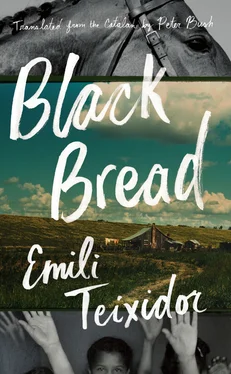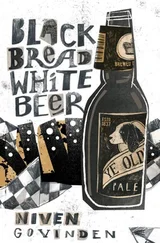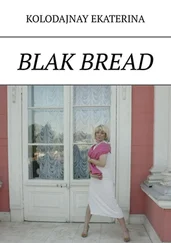“A greenfinch!” Cry-Baby suddenly shouted when she heard a bird sing nearby.
“Idiot!” laughed Quirze. “Greenfinches trill like canaries. That’s a tawny owl.”
A friend from school, Oak-Leaf, nearly always accompanied us on these forays. She was Quirze’s age, a year or two older than me, the daughter of the tenant farmers in Can Rovira, a farmhouse on the edge of the forest, in the direction of the crags. She only came with us occasionally because she often played truant, if there was a lot of work on at home or somebody was ill or she had to take things to the village shops or even Vic, a whole day’s walk there and back, when she would miss school. She had to walk the farthest and couldn’t stop with us for long; she said she was afraid to cross the woods in the pitch dark.
“What are you frightened of?” laughed Quirze sarcastically.
“Salamanders,” Oak-Leaf confessed, shutting her eyes as if she could see one in front of her. “They disgust me. And the little brook from the spring by the stream is full of them. When I walk close by, I run like mad so I don’t see them.”
Whenever her fear of salamanders came up, I wanted to add that Mother had been scared of them when she was a child, and even now, as a grownup, they still scared and disgusted her. But I didn’t because whenever I mentioned Mother, Quirze laughed, and said I was a mollycoddled softie, a little piece of shit…
“So what else frightens you?” persisted Quirze. “Salamanders are no big deal.”
“I’m afraid of Mad Antònia,” Oak-Leaf answered timidly, as if the revelation of the wood’s secrets might scare us or spark evil-doing.
These were the best bits of our little meetings with Oak-Leaf in the woods. They always ended the same way. First we went into the thickets to play, on the excuse that we were looking for birds, mushrooms or herbs, but we always ended up in some arbour asking Oak-Leaf to tell us what she’d seen at the bottom of woods. Then, when the time for secrets was over, we’d start a special game, the one about a peeping tom Quirze had got from somewhere, which was as exciting as the revelations about the secrets of the woods, with a number of big differences.
“What does Mad Antònia do when she runs through the woods?” enquired Quirze.
“She runs stark naked…” said Oak-Leaf, lowering her eyes, her cheeks red with embarrassment, “she wears no clothes at all…”
We’d all heard fragments of the story of the mad woman of Can Tona, who’d lost her senses at the end of the war, when they murdered her boyfriend in front of her, executed him by the fence round the pen that belonged to Antònia’s farmhouse, when neither her parents nor anybody else did anything to stop it.
“She went crazy,” Quirze reminded us, “because they found them in the barn coupled together like a dog and a bitch. They couldn’t separate them, just like dogs when they catch them at it. Sometimes, they have to cut off the male’s prick to pull them apart.”
Cry-Baby put her hands over her face. Oak-Leaf smiled obliquely, mischievously. I admired Quirze because he was so bold, nothing scared him, not even the strongest language.
“He was a lad on the run who’d worked at Can Tona during the war. A deserter from Aragon. The family didn’t want Antònia and the lad to keep seeing each other. He was too young, they said. And when the war was over, he’d be gone like all the refugees and they’d never see him again…”
“So when you see her running through the woods, is she really stark naked or does she wear something?” kept on Quirze. “Could I see her?”
“I’ve seen her run through the thickest part of the woods three or four times, in nettles and bracken, wallowing on the edges of fields in the sunlight, getting dirty on the ash and charcoal left by the burners…without a stitch on her, stark naked, her legs scratched and streaming with blood.”
Quirze kept on: “Tell me when I can see her, or the place where you can get an eyeful…”
Oak-Leaf nodded but didn’t commit herself.
The three of us were astounded by the girl’s lunacy — a young lass, said Grandmother, a young lass who was unfortunately fated to be a spinster — and the terrible things her madness made her do. And, in a way, we also understood the profound mercy shown by the woods that hid and protected her secret madness with an indifference that was more dignified than Oak-Leaf’s brutal interference, her vision that sullied everything and was an insult to the gentle discretion of the trees.
Oak-Leaf told us more stories. We didn’t have to lean on her to persuade her to come out with everything she’d discovered in the woods. The moment evening shadows began to darken the tops of the trees, she’d become agitated and say she must be going, she couldn’t stay and play or chat with us any longer: she was scared. That was the agreed prompt for us to persuade her to spill the beans about what she’d recently seen that she found so disturbing.
“A soldier’s bag…” she said. “The kind they call a kit-bag. Abandoned on a brambly path.”
“What was inside?” chirped Quirze right away.
“I didn’t dare touch it. It looked empty. I walked round it and started running in case a soldier or somebody was hiding in the bushes…”
“How could there be any soldiers if the war ended years ago?”
“You know, the ones that cross the border and kill people in their farms…”
“ Maquis , you mean the maquis . But they don’t wear soldiers’ uniforms, they dress like smugglers or country people, with a blanket over their shoulder, and a revolver and hunter’s pouch to carry their grub. That’s how the shepherds and farming folk say they dress. They’ve met quite a few, higher up in the mountains. And Grandfather Hand says the same, but he refuses to talk about them, and it puts him in a bad mood if he ever hears us mentioning them.”
“And what did you see next, I mean the next morning when you walked past that spot?” asked Cry-Baby.
“The morning after, it had gone, nothing was there. Someone had taken the khaki bag.”
There was a moment’s silence until Quirze came out with one of his outlandish comments: “A passing thief or charcoal burner had hidden it so he could squat down and have a shit; that’s why you didn’t see him. Kit-bags don’t walk by themselves.”
“A thief,” said Oak-Leaf, trying to ignore what Quirze had just said, like a card player who suddenly flings an ace or a high trump on the table to try and forget a previous bad play. “One day I did see a thief.”
“Hey!” I chimed in. “How did you know it was a thief? Perhaps he let on to you?”
“It was Charcoal Pete.”
“The one who comes to the woods to make charcoal?” we chorused incredulously.
What a discovery! Charcoal Pete was a thin, short, insignificant little guy, with sunken cheeks and an aubergine nose; the back of his pants were always torn, and he wore a collarless blue shirt, a waistcoat and cap too big for his bonce; a cigarette butt always hung from the corner of his lips; he was as poor as a church-mouse, with stacks of children and a wife as crazy as he was, who could never work because by the time her last child was starting to crawl, she already had another bun in the oven. Charcoal Pete took advantage of the early evenings his job in the textile factory left him free to come to the woods and make charcoal and slack he then sacked and sold in the village for stoves and braziers. When Charcoal Pete had covered the wood pile with earth, he’d light the bonfire and sit down a while to wait until it was all embers, plaiting reeds and herbs he found on the river bank to make round fans with a handle that he hawked around the houses alongside his small sacks of charcoal.
Читать дальше












